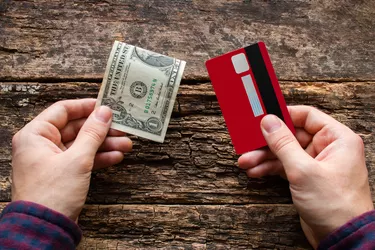
Cash is a standard medium of exchange for numerous types of businesses. Cash also is the primary means of payment for people who either can't open a checking account or have made the decision to stay out of the banking system. Businesses and individuals who operate on a currency basis, but also use credit cards to pay bills or make purchases, have several options for paying off balances with cash.
Paying at the Financial Institution
Video of the Day
Card holders can take cash to the bank or credit union that issued their credit card to pay monthly balances. In most cases, the teller can swipe the card to pull up the account, find the balance and accept payment. After making a cash payment, collect a receipt and confirm the deposit by accessing the account online or calling the customer service phone number on the back of the card. Be aware that financial institutions are required to report cash deposits over $10,000 to the IRS. An institution also may report multiple cash deposits of just under $10,000 if it suspects that deposits are being structured to avoid reporting.
Video of the Day
Using a Debit Card Online
If going to the location of the card credit card issuer is not feasible, the local bank that issued your debit card may provide a solution. In this situation, cash would first be deposited to the debit card. The payment then can be submitted online using the debit card, either directly to the issuer or using a service that specializes in online money transfers. An example of this type of service is MoneyGram, which can be accessed either online or by walking into a Walmart location.
Western Union
Wire transfers from Western Union are an accepted form of payment at financial institutions around the world. To make a payment in cash, customers can go into a Western Union office and present the bill to be paid, or find their credit card issuer using the company's payee locator. If the service is being used for the first time, an account can be opened with a list of the customer's usual payees including credit card issuers. With account information on hand, payees and accounts can be accessed for quick transactions. The customer then can submit the cash for payment of the bill and a service fee for wiring the money. A receipt for payment is generated once the receipt of the wire by the credit card issuer is confirmed.
Check Cashing Services
Many check cashing stores offer services that allow someone to deposit cash to pay a variety of bills, including credit cards. For people who receive payroll checks, tax refunds, or money orders but don't have a checking account, these stores offer the convenience of being able to cash a variety of checks and pay bills at a single location. Generally speaking, a valid ID is a necessity for check cashing, while paying a credit card bill requires a statement from the card issuer. For added convenience, some check cashing stores offer services similar to banks, including pre-paid debit cards and direct check deposits for payroll and government checks.